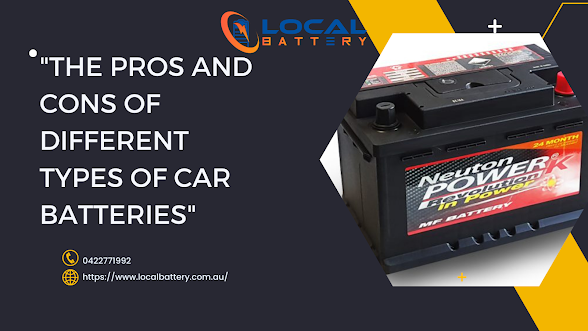"The Pros and Cons of Different Types of Car Batteries"
Car batteries are an
essential component of any vehicle, providing the power needed to start the
engine and keep all of the electrical systems running smoothly. There are a
variety of different types of car batteries available on the market, each with
their own set of pros and cons. Here, we'll take a look at some of the most
common types of car batteries and explore the advantages and disadvantages of
each.
Lead-Acid
Batteries: Lead-acid
batteries are the most common type of car battery and have been in use for over
a century. They are inexpensive, widely available, and have a long lifespan.
However, they do require regular maintenance, such as checking the water levels
and ensuring that the terminals are clean and tight. They are also quite heavy
and bulky, which can be a disadvantage for some vehicles.
Lithium-Ion
Batteries:
Lithium-ion batteries are becoming increasingly popular in recent years. They
are much lighter and more compact than lead-acid batteries, making them a great
choice for smaller vehicles. They also have a longer lifespan and require less
maintenance. However, they are more expensive than lead-acid batteries and can
be more sensitive to extreme temperatures.
Nickel-Metal
Hydride Batteries:
Nickel-metal hydride batteries are similar to lithium-ion batteries in terms of
their lifespan and maintenance requirements. They are also more environmentally
friendly than lead-acid batteries. However, they are generally more expensive
than lead-acid batteries and can be less energy-dense.
Absorbed
Glass Mat (AGM) Batteries: AGM batteries are a type of lead-acid battery that features an
absorbent glass mat that separates the acid and lead plates. They are more
durable and require less maintenance than traditional lead-acid batteries. They
are also more resistant to extreme temperatures and vibrations. However, they
are also more expensive than traditional lead-acid batteries.
In
conclusion, the type of local battery that is best for you will depend
on your specific needs and preferences. Lead-acid batteries are a great option
for those on a budget, while lithium-ion batteries are a great choice for those
looking for a longer lifespan and less maintenance. Nickel-metal hydride
batteries and AGM batteries are suitable for those who are more environmentally
conscious and have more demanding requirements. It's always best to consult
with a professional before making your final decision.
Lead-Acid Batteries:
Advantages and Disadvantages
Lead-acid batteries are a type of rechargeable
battery that use lead and lead oxide as the electrodes and sulfuric acid as the
electrolyte. They have been widely used in automobiles, backup power systems,
and other applications for over a century.
Advantages:
Widely available and relatively low cost
High energy density, meaning they can store a lot
of energy for their size and weight
Long service life, with a typical lifespan of 2-5
years for automotive applications
Well-established technology, with a proven track
record of reliability
Disadvantages:
Heavy and bulky, making them less suitable for
portable applications
Require regular maintenance, such as adding
distilled water to the cells to maintain the proper level of electrolyte
Can be damaged by deep discharging, overcharging,
or extreme temperatures
Not as energy-efficient as some newer technologies
such as lithium-ion batteries
Not environmentally friendly, as lead-acid
batteries are considered as hazardous waste.
Lithium-Ion Batteries: Pros
and Cons
Lithium-ion
batteries have several advantages over other types of batteries. Some of the
main pros include:
High
energy density:
Lithium-ion batteries can store a lot of energy in a small amount of space,
making them ideal for portable devices and electric vehicles.
Low
self-discharge rate:
Lithium-ion batteries lose less of their charge over time when not in use
compared to other types of batteries.
No memory
effect: Lithium-ion
batteries do not experience a "memory effect," which can reduce the
capacity of other types of batteries over time.
Low
maintenance:
Lithium-ion batteries require very little maintenance and can last for several
years with proper care.
However,
there are also some cons to consider:
Cost:
Lithium-ion batteries are generally more expensive than other types of
batteries.
Safety
concerns:
Lithium-ion batteries can be dangerous if damaged or improperly handled. They
have been known to overheat, catch fire, or even explode.
Limited
lifespan:
Lithium-ion batteries have a limited lifespan and will eventually need to be
replaced.
Environmental
concerns: Manufacturing
and disposing of lithium-ion batteries can have negative environmental impacts.




Comments
Post a Comment